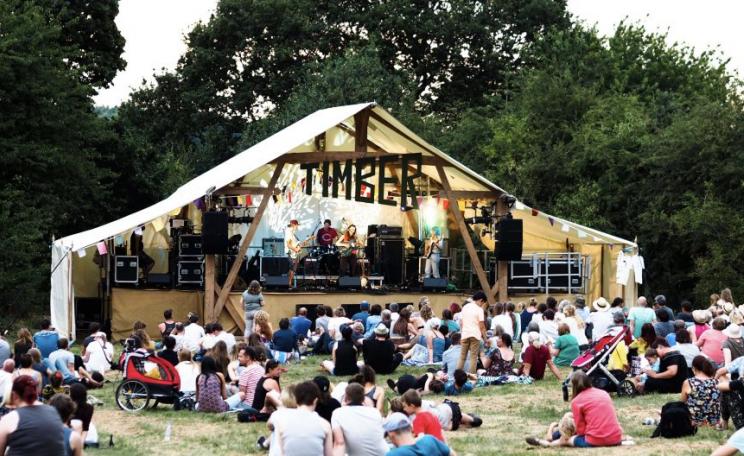We’ve created new spaces and platforms for people to come together and will now start to plan for 2021 with a renewed sense of purpose, excitement and ambition
My summer has been filled with the sounds of a three-toed sloth from a forest in Honduras, a Huon Bowerbird in Papua New Guinea and Cicades in Ghana, an unexpected outcome of Covid 19, but more of that later.
I’m one of the directors of Timber Festival, a weekend camping festival set to take place in July and like many in the arts and events sector I have spent much of the last five months reimagining what our work would look like if it meant adapting to a socially distanced world as well as trying to work out how we can contribute to helping people imagine a sustainable and just future.
The lockdown offered some space and perspective to think about our mission and purpose and discuss ways we could amplify that without a physical audience.
Connection
Timber’s remit is to celebrate our connection to trees and woodlands through music, art and ideas, taking its inspiration from the transformed landscape of the National Forest in the Midlands.
Understanding how resilient, adaptive and multifaceted forests are has offered us real hope that we could find a way through the crisis.
So I’d like to talk in particular about three projects we have delivered during this strange summer which speak to the festival being a catalyst for change:
Firstly the Timber Takeover here in The Ecologist. This project is a great advert for collaboration, having been suggested by Andrew Weatherall from the National School of Forestry at the University of Cumbria.
A wonderful advocate for Timber festival, Andrew helped to establish and then co-ordinate a range of articles that took the conversations, provocations and ideas that would have been discussed at the festival online to share with a wider audience. This not only resulted in us harnessing the voices of some of the brilliant speakers who would have adorned the festival stages but also felt like a real celebration of a relationship established between the event team, the team at the National School of Forestry and staff at The Ecologist.
We’ve created new spaces and platforms for people to come together and will now start to plan for 2021 with a renewed sense of purpose, excitement and ambition
This is a relationship that has explored how arts and culture can be used as a vehicle to help translate research in environmental science to the general public, creating new passions and enthusiasms.
Gathering
This was followed, as strict lockdown restrictions allowed, with a real life gathering at The Forge, our woodland HQ in Cheshire, which aimed to build on the success of the articles and bring individuals together from cross sector perspectives working in public health, science, education and arts.
A weekend in the woods, sharing work and benefitting from learning more about each other’s perspectives, we talked about folklore and legend, carbon capture and landscape restoration. We walked, we carved, we hugged (the trees not each other) and came away reinvigorated about the challenges ahead.
And finally I’d like to return to those sloths and talk about Sounds of the Forest, an audio project aiming to build a global forest sound map through a co-creation process. We wanted to encourage people to go to their local woodlands and forests and take time to stop, listen and record the harmonies of nature then upload these online.
We’ve been overwhelmed by the response, hundreds of sounds from over 50 countries have been submitted and have transported thousands of us to forests around the world. It’s made me feel more connected than I could possibly have imagined in a time lacking physical connectivity.
The next iteration of this project will be to commission musicians and poets to respond to the forest sounds which are all available open source through creative commons and we hope some new music composed will be performed on the stage at Timber Festival next summer.
Achievements
You can still add your sound or listen to others on our website.
Of course not everything has gone seamlessly and it felt like we’d bitten off more than we could chew when trying to livestream a 360 degree tightrope walk from the forest canopy. But livestreaming aside, the final recording offers a wonderfully different perspective on the forest for audiences to enjoy.
We’ve achieved a far greater reach than we would have otherwise this year, been included in a documentary in South Korea, featured in the Hungarian press and invited to appear on podcasts in the UK.
We’ve created new spaces and platforms for people to come together and will now start to plan for 2021 with a renewed sense of purpose, excitement and ambition. With new relationships established and a very different perspective on how imperative the festival is as a catalyst for change and how it can help us dream about new ways of living sustainable and prosperous lives.
Right, I’m off to listen to some Lemurs from Madagascar.
This Author
Sarah Bird is director of Wild Rumpus CIC, a social enterprise producing large scale outdoor arts events, most often in wild natural landscapes. To make a donation to support the next Timber festival, visit JustGiving.





